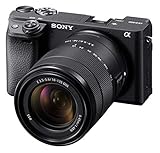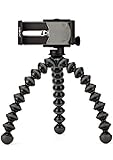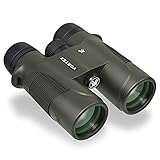Trying to figure out the best way to see Grand Teton without tons of hiking or complicated logistics? You’re in the right place.
The 42-Mile Scenic Loop Drive Grand Teton National Park is hands-down the easiest – and most stunning – way to experience the park’s highlights.
But knowing where to start, which direction to drive, and what stops are worth your time? That’s where it gets tricky.
I’ve driven this loop multiple times in different seasons, and each trip taught me something new. Some pullouts have unforgettable views; others, I’d skip next time. I’ll tell you what I loved, what I didn’t, and how to make the most of your time behind the wheel.
This guide is best for anyone who wants to see the iconic Teton peaks, wildlife, lakes, and viewpoints – without the need for backcountry gear or all-day treks.
Want a teaser? Schwabacher Landing is one stop you cannot miss. It’s one of the best spots for sunset photos in the entire park.
So if you’re ready for epic views with minimal effort, let’s map out your perfect drive.
🛏️TOP HOTEL PICK: Check availability now
🚘FIND THE CHEAPEST CAR RENTAL: Search Discover Cars for the best deals
✈️FIND THE CHEAPEST FLIGHTS: Search Skyscanner for the best deals
🧳GET TRAVEL INSURANCE:Get insured with Travelex before you go
📱TAKE AN AUDIO TOUR: Buy an audio tour now
‼️ This post is written for doing the Grand Teton 42 mile loop in summer when everything is open. However, it’s also possible to do part of the drive in winter. If you’re visiting Grand Teton National Park in winter, check out the best things to do in winter in the Grand Tetons and Jackson and read my Guide to Visiting Grand Teton National Park in winter.
Subscribe to daily national parks planning tips, travel inspiration and trip ideas and get instant access to the free PDF of this
Guide to 42-mile Scenic Grand Tetons Drive
Table of Contents
Description of the 42-mile Scenic Loop Drive, Grand Teton National Park
I’ll describe the Grand Teton National Park scenic drive from Moose in a clockwise direction (though you can go in the opposite direction, of course).
The Inner Park Road
If you’re coming from Jackson, head north out of town on 26/89/191 and start the Grand Teton scenic byway at Moose, turning left off the highway and crossing the Snake River to arrive in this small settlement.
Moose
It’s worth visiting spending time in Moose for Doonan’s Chuckwagon; the Church of Transfiguration, a tiny wooden church with a large window behind the altar framing stunning views of the Grand Teton mountains; and Menors Ferry historic district.
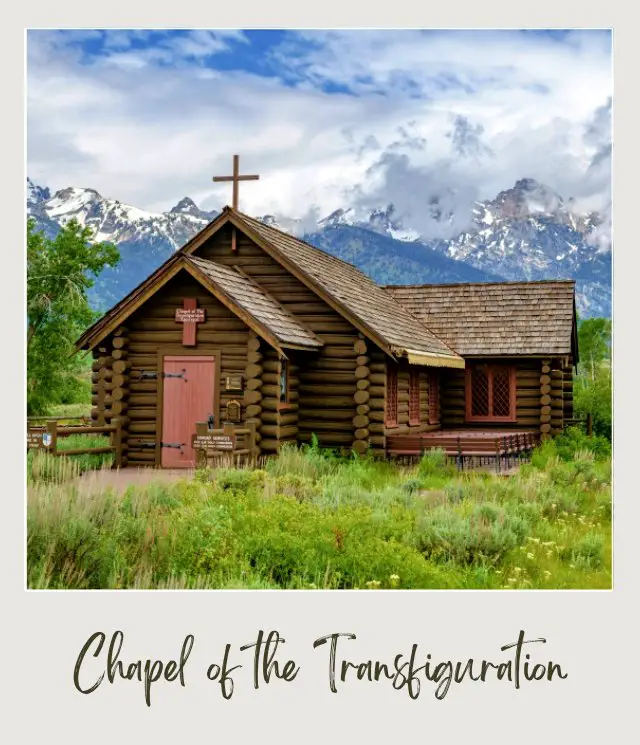
You can take a side trip on the Moose Wilson Road, where there is a good chance of seeing wildlife.
After leaving Moose, drive north along Teton Park Road past Windy Point Turnout and Taggart Lake Trailhead to arrive at Jenny Lake after about 7.7 miles (approx. 15 minutes if you don’t stop). Jenny Lake is the starting point for many great hikes (see my post on The Best Hikes in Grand Teton NP for more details) plus boat trips on the lake.
Jenny Lake
From Jenny Lake, continue north on Teton Park Road for 3.3 miles. This is about six minutes without stopping, but you should stop at the Cascade Canyon turnout for direct views into the canyon.
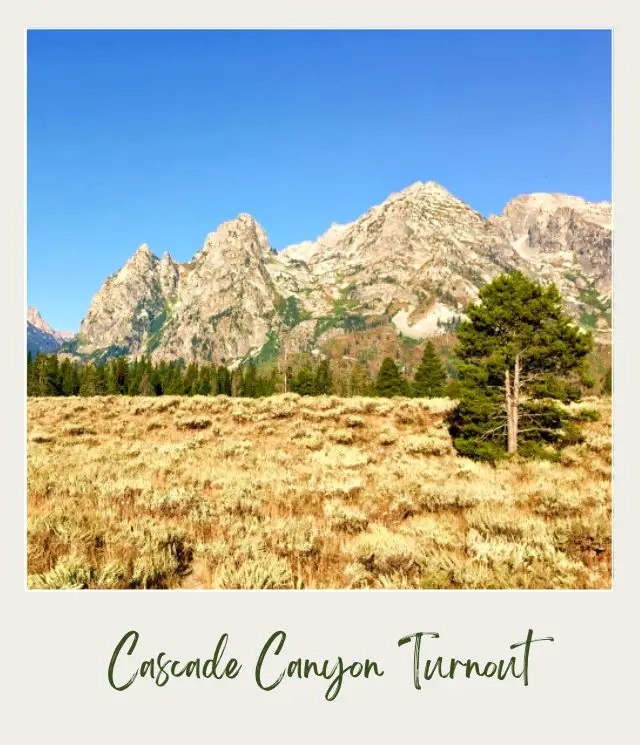
3.3 miles north of the Jenny Lake is the Jenny Lake Loop road to the left. The Jenny Lake scenic drive is a 4-mile one-way road south heading south via the Cathedral Group Turnout (definitely worth a stop, as the Cathedral Group of peaks are some of the most stunning in the park).
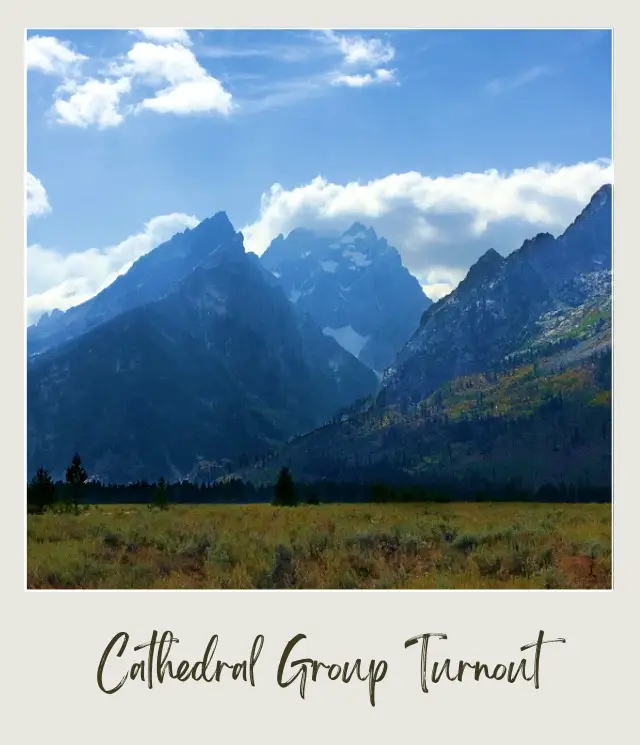
Other stops include the trailheads for Leigh and String Lakes (see Best Hikes in Grand Teton National Park for full details of these hikes), the Jenny Lake Lodge (the grand jewel of the lodges in the park – and one of the best national park lodges and inns) and the Jenny Lake Overlook. This is definitely best in the morning, as the sun is behind it in the afternoon, causing a silhouette/ bad lighting for photography.
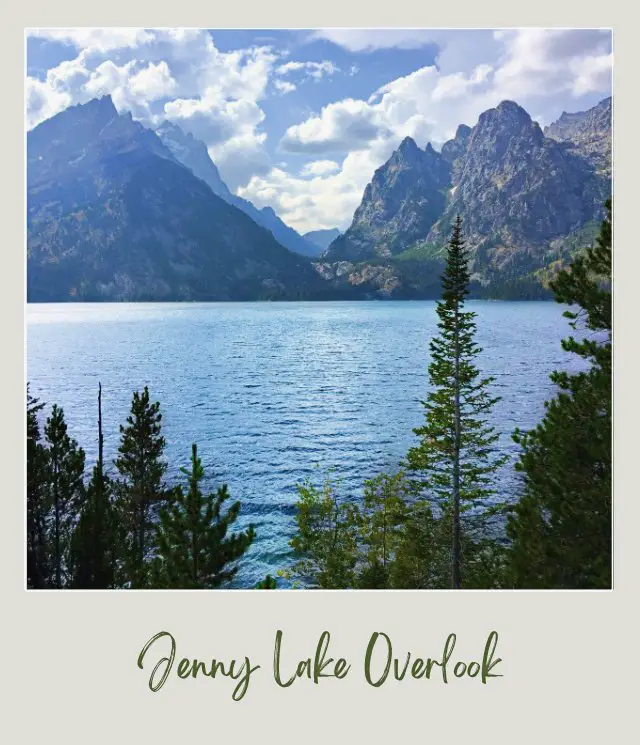
Signal Mountain
You will eventually get back to Teton Park Drive. Turn left/ north and repeat this 2.3 miles/ 3.7 km of the main loop drive. From the north end of the Jenny Lake Loop road, it is 6 miles/ 9.7 km (8 minutes with no stops) to the turn off to Signal Mountain Road to the right. On the way are Mountain View Turnout, Mount Moran Turnout and Potholes Turnout.
You can hike from Signal Mountain Lodge up to the Signal Mountain summit (worth it if you like to hike, see details of this here), but you can also drive. Near the top of Signal Mountain is Jackson Lake Overview, which is a great place to see the sunrise, as you will see the first rays of dawn shining on the mountains, turning Teton Peak a brilliant orange color, then turning the mountains a beautiful pink and orange behind Jackson Lake.
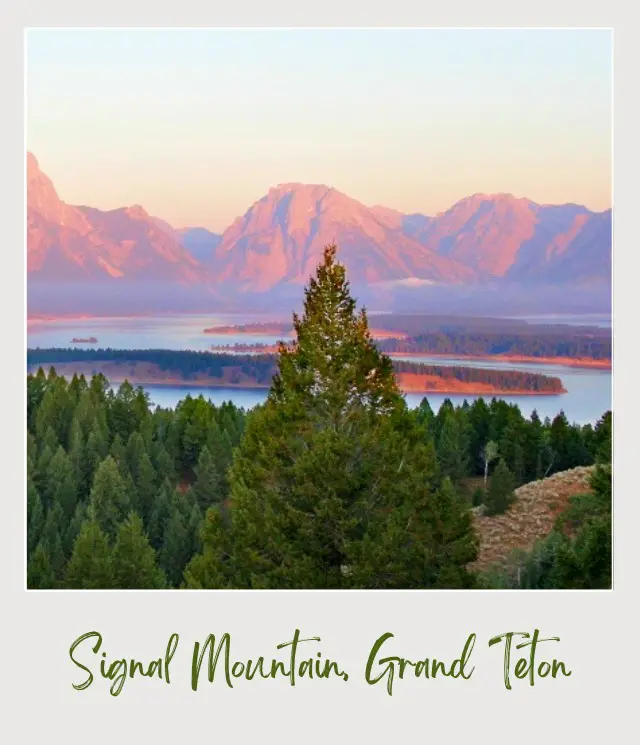
If you’re doing the drive in the afternoon, there is a viewpoint at the top of the mountain over Jackson Hole valley and the Gros Ventre Mountains that is different from the mountain views of the Grand Tetons, but beautiful nonetheless.
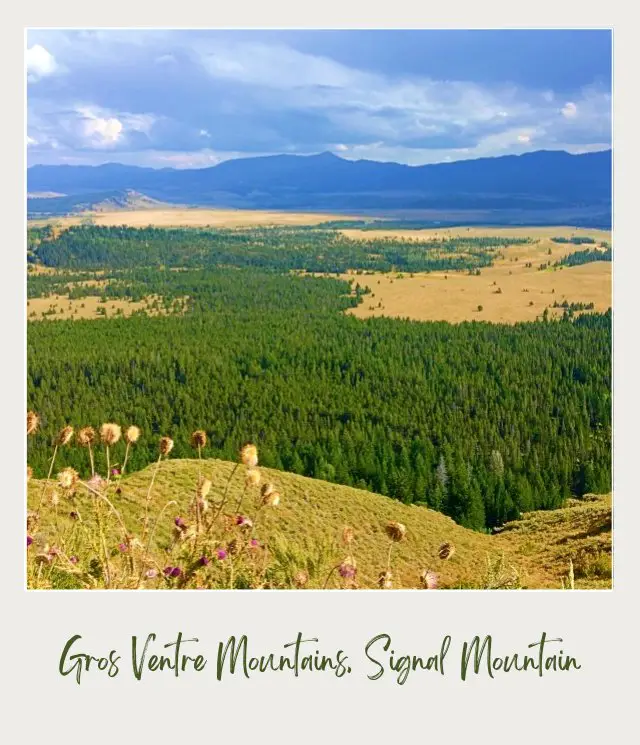
Back on the main Teton Park Road, it is another 1.2 miles/ 1.9 km north to Signal Mountain Lodge, where there is access for boating, dining and accommodations.
Continuing north for another 1.7 miles/ 2.7 km is Jackson Lake Dam.
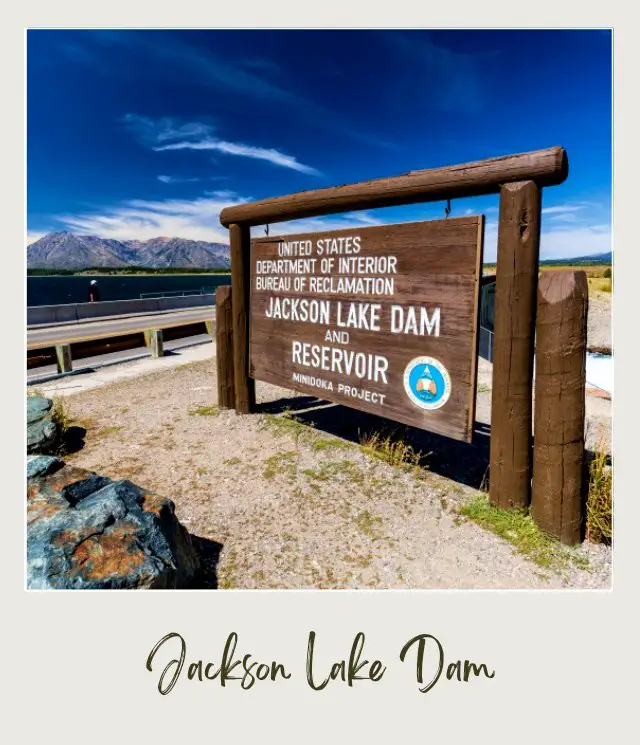
1.3 miles from there is the junction with John D Rockefeller Junior Parkway (Route 191). Turn right.
The Outer Road
If you’re coming from Yellowstone, this is where you’ll join the 42-mile loop. Grand Teton National Park entrance fee is only needed for the inner road. Let’s continue in a clockwise direction along the outer road.
Oxbow Bend
It is just another 1.2 miles/ 1.9 km to Oxbow Bend, one of the most famous scenic viewpoints in the park. In the early morning, this bend of the Snake River often provides a perfect reflection for the mountain views.
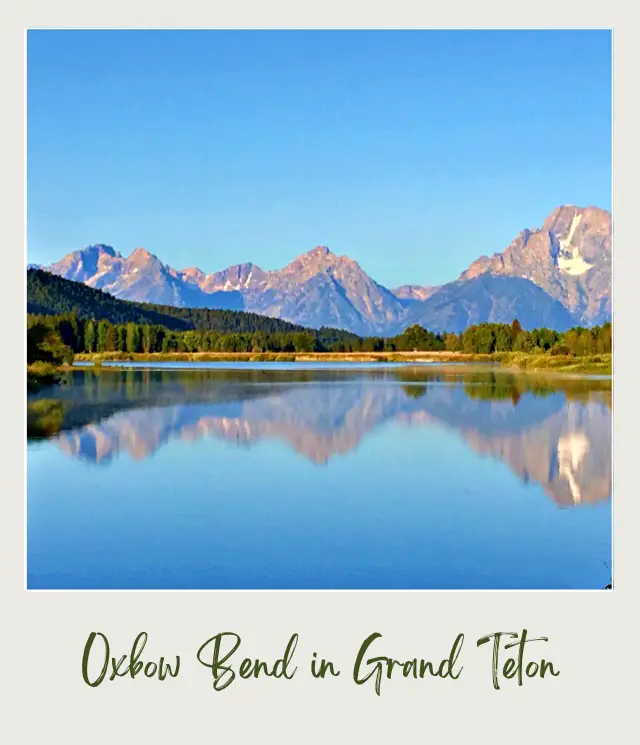
5 minutes – 2.5 miles/ 4 km from this is the Moran entrance to the Park. Just past this is the junction to Highway 26/287 which is where you’ll come from if you come from Dubois.
Turn right on to US 26/ Highway 89/ 191. This road runs roughly parallel to Teton Park Road, but is further away from the mountains. Most of this stretch goes through farmland, and there are good chances of seeing herds of bison in the fields along the roadside. 2.3 miles/ 3.7 km along is Elk Ranch Flats turnout on the right, which is worth a quick stop.
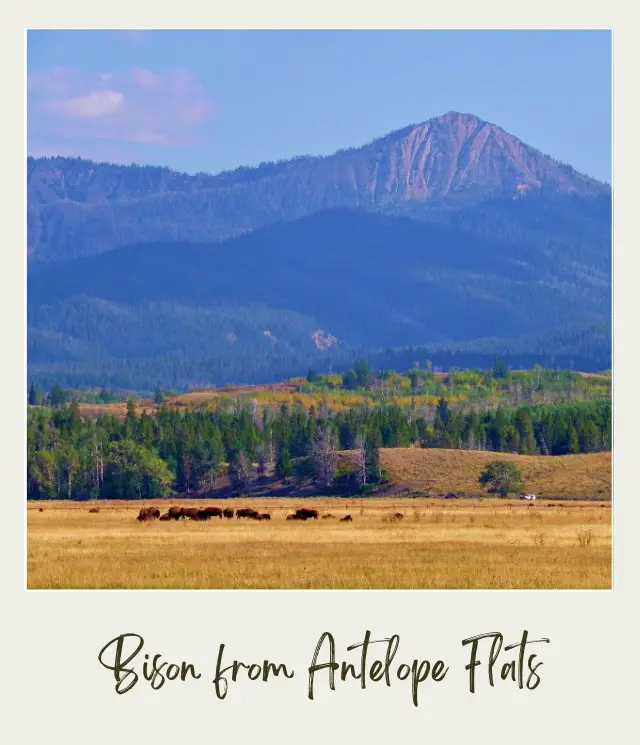
Cunningham Cabin
Another 2.1 miles/ 3.4 km is Cunningham Cabin Historic Site down a short road to the right. This was the scene of a historic wild west shoot out back in the day. Pick up a pamphlet with more information near the small parking lot.
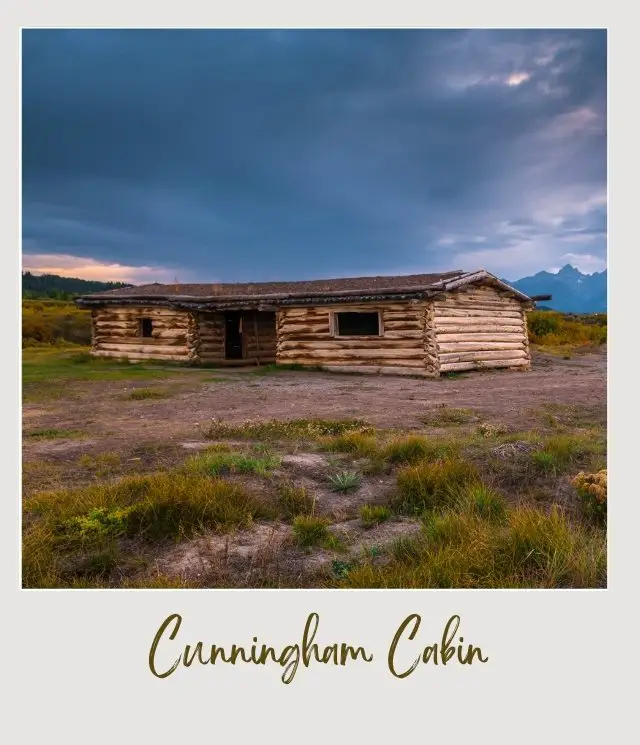
Snake River Overlook
A further 4.2 miles/ 6.8 km takes you to Snake River Overlook, also on the right. This is a ‘don’t miss’ stop. It’s the place where the famous photographer Ansel Adams took many of his most iconic photos of the mountains.
The view is truly stunning – with a lovely bend of the Snake River in the foreground below you and the mountains forming the perfect backdrop.
This is a great spot to see the sunrise. The sun rises behind you, but the mountains glow in the first beams of early morning light.
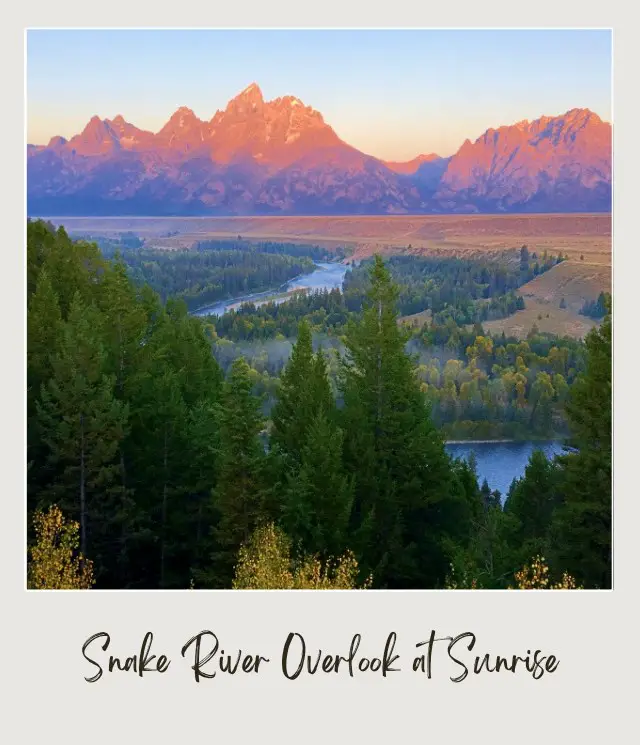
Schwabacher Landing
Another 3 miles/ 4.8 km along is Teton Point lookout on the right, with more great views. Then 1.3 more miles/ 2 km is the turnoff to Schwabacher Landing. Keep a careful eye out for the sign.
You’ll turn off on to a dirt road and it’s a short drive to the end of the road. There are two parking areas near each other. From there, you can do short walks along the Snake River.
Moose are commonly seen here, and if you’re very lucky, you can get the classic shot of a moose with water dripping off its chin, framed by the Grand Teton ranges. There’s also a beaver dam and plenty of birds.
Photography is best in the morning, but it’s also a great place to come in the late afternoon to see the wildlife and birdlife.
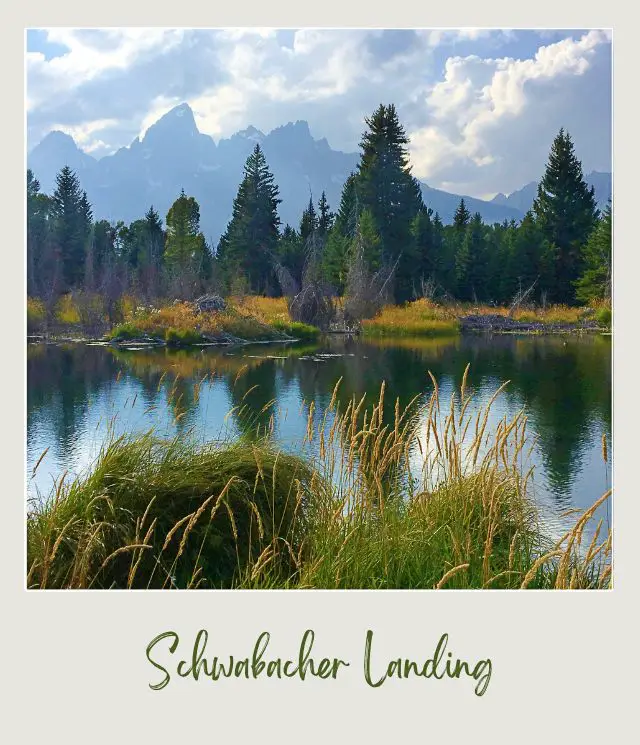
Back on the main road, Glacier Point Turnout is 0.6 miles/ 1 km further down the road, then Blacktail Pond Overlook another 2.1 miles/ 3.4 km along, down a short side road to the right. Just past this is Antelope Flats Road to the left.
Mormon Row
Turn down Antelope Flats road to get to Mormon Row. Mormon Row is a major historical site in the area. Originally settled by a group of Mormons in the mid 1800’s, it became a farming community.
Today, there are six main buildings, a drainage system, barns, fields and corrals. It’s most famous for the photogenic Moulton Barn, built in 1935.
1.6 miles/ 2.5 km down the road, take the first right. Moulton Barn is 0.3 miles/ 0.5 km down the road on your right. If you’ve seen photos of a picturesque barn with the Grand Teton mountains behind it, then chances are it is Moulton Barn. This is maybe the single most iconic shot of the mountains.
For the classic photo, there is a spot (worn bare) near the fence off to the left and in front, some distance away from the barn. This spot frames the barn perfectly.
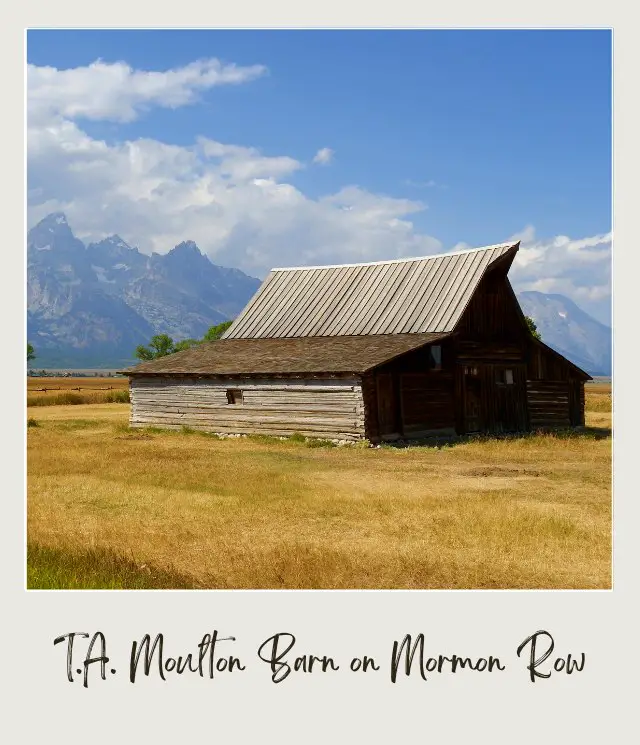
Back on the main road, it is 1.2 miles/ 2km to the junction with Teton Park Road to the right. This will take you back to Moose.
If you entered the scenic road loop from Yellowstone or Dubois, turn right to continue around the loop. If you came from Jackson and want to return, then keep going straight.
Hopefully you’re excited about this scenic drive and want to do it all. You totally can. But you may be wondering “How do I include all this into my trip to Grand Teton National Park?” I hear this all the time.
Getting an idea of what to do is a start – and an important start. But the really tricky part is coordinating everything into an itinerary that actually makes sense – so that you’re seeing and doing everything along the drive at the right time of day, joining them all together in a logical order, and managing all the logistics that makes them happen.
To help take away the overwhelm of planning a trip to the Tetons, I’ve created several super detailed itineraries.
There are 1-, 2-, and 3- day options for Grand Teton National Park: all with detailed hour-by-hour schedules, including alternatives for different activity and fitness levels, plus trail maps and descriptions, driving instructions, important information, essential tips, and everything else you need to make the most of your time in Grand Teton National Park.
Obviously, the more days you spend in Grand Teton National Park, the more things you can do, but the itineraries will help you make the most of whatever time you have available. All the itineraries include the scenic drive!
42-mile Scenic Loop Drive Grand Teton National Park Map
Click on the Grand Teton scenic loop map to see the full route and the major points of interest along the way.
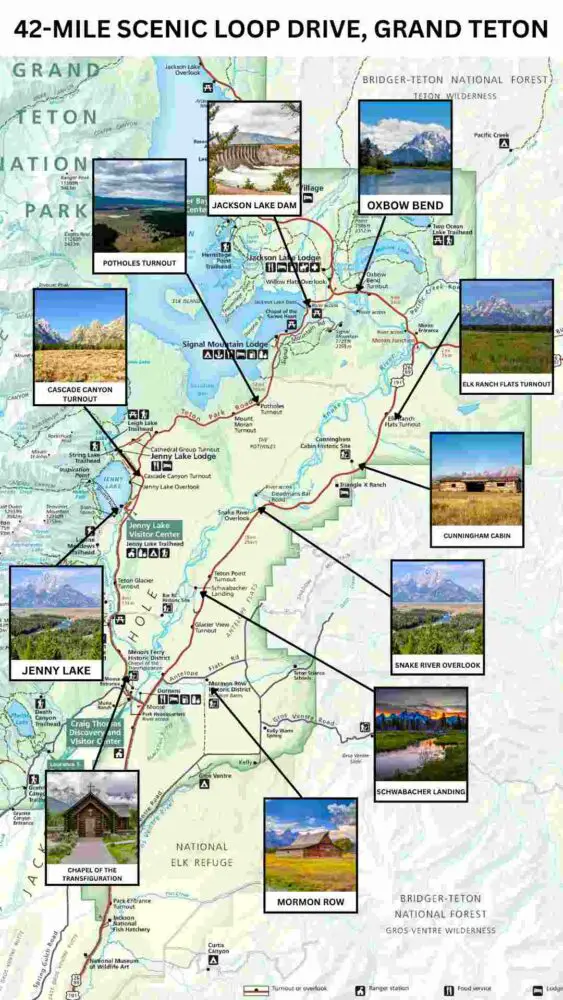
You can save the Grand Teton scenic drive map for easy reference.
The 42-mile Scenic Loop Drive, Grand Teton National Park FAQs
Can you drive through Grand Teton National Park?
Yes, you can. In fact, when you take the 42 mile scenic drive, Grand Teton National Park reveals itself in all its splendor :-).
Read More:
➡️ How to Get to Grand Teton National Park
➡️ Best Airports For Grand Teton National Park
What is the 42- mile scenic loop drive?
There are two main Grand Teton National Park scenic drives – the inner road and the outer road. The Grand Teton loop drive route combines them both. It goes along Teton Park Road (the inner park road, Grand Teton NP), which runs parallel to the mountains inside the park and then loops around, continuing back along the parallel US 26, which is a little further away from the mountains but still with incredible views of the mountains.
How long does it take to drive the loop in Grand Teton National Park?
The whole 42 miles/ 67.5 km scenic drive through Grand Teton National Park takes 1-2 hours (or even longer), depending on how often and for how long you stop. However, the Grand Teton drive will almost certainly take you much longer, as there are so many places to stop and take in the views along the way.
Where does the 42 Mile Scenic Drive start?
You can enter the drive from three different points.
🚘 From Jackson in the south, drive north on 191/ 89/ 26 (the same road – it just shares three numbers) to Moose Junction and start there.
🚘 If you’re coming from Yellowstone in the north, you will enter the loop at the Jackson Lake Junction.
🚘You can also come from the Dubois in the east via the Togwotee Pass and enter at the Moran Junction.
When is the Grand Teton loop road open?
Can you drive through Grand Teton National Park in winter?
Yes, but the full loop road is not open year-round. The inner road (Teton Park Road) can get a great deal of snow in winter, so Teton Park Road is closed to vehicular traffic November 1 – April 30 and open May 1 – October 31.
The outer road is a highway (it shares the numbers 26/89/191) and is kept clear year round.
What are the highlights of the Grand Teton National Park drive?
I strongly recommend doing the entire Grand Teton National Park loop, whether that it all at once or broken up over two or more days. Driving through Grand Teton National Park really is the best way to see the park (in addition to getting out and hitting the hiking trails). I also recommend taking your time and stopping at all the stops.
However, if your time is limited and you just want to see the top highlights on the Grand Teton drive loop, stops absolutely not to miss are:
📷 Oxbow Bend
📷 Snake River Overlook
📷 Schwabacher Landing
📷 Mormon Row
📷 Jenny Lake
📷 Signal Mountain
➡️ Read more about these in my guide to the best viewpoints in Grand Teton National Park.
When is the best time of day for the Grand Teton loop drive?
The drive is best done in the early morning or dusk.
Early morning is best, because there is a good chance of seeing wildlife, plus the mountains glow a bright golden color when the first beams of sunlight shine on them. Even if you don’t manage to get up for the sunrise, the light is best on the Teton ranges throughout the morning.
Noon to mid-afternoon is the worst time, as the mountains are silhouetted and photos typically don’t turn out well (I speak from experience!). However, the views are lovely looking towards the Gros Ventre Mountains at this time, for example, from the top of Signal Mountain.
Sunset over the mountains, especially the minutes after the sun has actually set behind the peaks, can be stunning and dusk is a good time to see moose and bears.
How can I do the Grand Teton National Park scenic loop drive?
There are really two options:
1. Drive yourself
If you didn’t drive to Grand Teton National Park in your own car, you can rent a car. If you are only visiting Grand Teton National Park or starting your trip here, you will fly into Jackson Hole airport. You can pick up a rental car there and then do the drive yourself.
A Grand Teton self driving tour gives you the greatest flexibility. You can take as long as you want and spend extra time to see wildlife or soak in views that you especially love. You can also do the drive more than once (as I did) at different times of the day.
➡️ Find the best rental car for you right here
➡️ Before you book your rental car, read my Guide to Finding the Cheapest Car Rental for tips on how to save money.
Note that the inner Teton Park Road is inside the national park gates, so you will need to pay an entrance fee for the park. It costs $35/ week for vehicles.
Something to keep in mind is that if you plan to visit more than a couple of parks in a year (or the same park more than twice), then look at getting the America the Beautiful Pass. It gives you unlimited access for a year (from date of purchase) to over 2,000 federal recreation sites including all U.S. national parks plus national forest and BLM lands. It includes admission for one vehicle or four people (for places that charge per person).
➡️ Buy the America the Beautiful Pass here
2. Take a tour
Driving in Grand Teton National Park is pretty easy, but if you don’t want to drive, there is another option. You can get a transfer from the airport to Jackson (book one here to save yourself the hassle of arranging it when you get there), and then arrange a half day or day tour that will take you along the scenic drive.
A big advantage to taking a tour is that the guides know the best photo spots and likely places to see wildlife. Health and safety measures are all taken on these tours.
Half Day tour from Jackson or Teton Village.
The four-hour tour hits all of the highlights including Mormon Row and Moulton Barn, Moose, Signal Mountain, Oxbow Bend, Elk Ranch Flats (which is where I saw bison for the first time) and Snake River Overlook (where Ansel Adams took his iconic photos of the Grand Tetons). Maximum 10 travelers.
➡️ Check availability and prices for the half-day tour here
Full day private tour from any location in the area.
If half a day isn’t enough and if you would rather have a private tour and all the flexibility that that gives you (you can stay longer if you are enjoying a particular stop) then this private tour is the best choice for you. The tour, which can accommodate up to 4 people, is 8-9 hours and includes lunch and binoculars for wildlife spotting. The longer time period means you have a greater chance of seeing animals. The tour travels the entire scenic loop road with multiple stops along the way.
➡️ Check availability and prices for the full-day private tour here
What do I need to take on the Grand Teton scenic drive?
There are a few main things I recommend (other than snacks):
1. A camera (or camera phone)
Grand Tetons National Park is a photographer’s dream. I use my iPhone and this suits me just fine as I’m not a hard-core photographer, but I was glad I had it.
If you are serious about photography, you will have a real camera with all the bells and whistles, and you will certainly take better photos than I do.
If you have a Sony A6400 camera, check out the best lenses for the Sony A6400 here.
2. A tripod
If you are taking photos in the early morning or late afternoon, a tripod is essential for long exposure shots. Because I don’t want to spend my vacation lugging around lots of equipment, I use a Gorillapod tripod. It’s tiny, flexible, light and can be set up on all types of uneven surfaces. They sell them for regular cameras and cell phones.
➡️ Check out prices for regular camera Gorillapods here and for cell phone Gorillapods here.
3. A wide-angle lens and a zoom lens
Most of the time my camera phone is fine as is, and with the iPhone 11, there is a wide-angle feature, which I love, but the wider the better for the expansive landscapes of the Grand Tetons.
You can get a set of a 0.45x wide-angle lens and a 15x macro lens for close ups. It’s compatible with all single and dual-camera phones including all iPhone models, Samsung Galaxy and Note, Google Pixel, Huawei and more. ➡️ Check prices on Amazon here.
The digital zoom on a camera phone gives the illusion of getting close, but then when you look at the photos later, they are not at all clear. An optical zoom is much better.
For a zoom lens, check out this 28x telephoto lens. It works on the front and rear cameras for both single-camera and multi-camera phones including iPhone11 XS MAX XS XR X 8 Plus 8 7 Plus 7 6 Plus 6, Samsung Galaxy S9 Plus S9 S8 Plus S8 S7, Edge S7 S6 Edge+ S6 Edge S6, Google Pixel 3 XL 3 2 XL 2 XL LG iPad, Motorola HTC One Plus, HUAWEI and more. ➡️ Check out prices on Amazon here.
4. Binoculars
Even if you aren’t a serious birdwatcher, a solid pair of binoculars is a great investment for this trip. The best binoculars for the money are the Vortex Optics Diamondback 10×42 Roof Prism Binoculars. They are reasonably priced, good for casual wildlife viewing and come with a carry case. I used them to see bison, moose and black bears up close, all on this drive. ➡️ Check them out on Amazon here.
Because I take binoculars on all of trips (and have a pair in my kitchen to check out deer in my backyard), I have done extensive research into the best binoculars. These detailed guides include helpful info on what to look for, detailed reviews of the best of the best, and recommendations based on what exactly you will use them for and your price range:
➡️ Guide to the best binoculars for the money
➡️ Guide to the best binoculars under $300
➡️ Guide to the best binoculars under $200
➡️ Guide to the best binoculars under $100
Safety when driving the Teton scenic loop
There isn’t a huge amount of traffic on this road and the road is well maintained in season. However, there is some traffic AND you may encounter large animals. Therefore, always use the turnouts to pull over and take photos. It can be dangerous pulling over to see wildlife just along the side of the road.
At night, drive slowly and keep an eye out for animals. We saw black bears on the road at late dusk. Elk, bison, mule deer and pronghorn antelope also frequently cross roads and moose even use the roads to travel along at times, so be careful.
One way to make your planning easy and stress free is with a detailed itinerary. I have 1-, 2- and 3-day itineraries for Grand Teton National Park that include all the park highlights, give you choices based on your preferred activity level, and take all the stress out of planning your trip.
Travel insurance for Grand Teton National Park
You do NOT want to hit a moose with your car (you will be the loser in that ‘fight’). Even animals that are smaller than a moose (which is BIG) will do damage to your rental car and if you don’t have insurance, it will be a very expensive encounter. Travel insurance covers other things too such as a lost or damaged camera and illness, so you should never travel without good travel insurance. If you want to learn more about travel insurance, read my Guide to Buying Travel Insurance.
➡️ A good insurance option is Travelex. You can compare Travel Insurance plans here or get a quote right now:
Enjoy the drive!
Additional Planning Resources for Grand Teton National Park
⭐ Grand Teton National Park Guide
⭐ Grand Teton Itinerary
⭐ Planning a Trip to Grand Teton National Park: 7 Mistakes to Avoid
⭐ Best Things To Do In Grand Teton National Park
⭐ Tips For Visiting Grand Teton National Park
⭐ Best Grand Teton Viewpoints
⭐ Best Hikes in Grand Teton National Park
⭐ Hiking The Cascade Canyon Trail, Grand Teton National Park
⭐ How Many Days in Grand Teton National Park?
⭐ Best Things to Do in Grand Teton National Park in Winter
⭐ Visiting Grand Teton National Park in Winter: Complete Guide
⭐ When is the Best Time to Visit Grand Teton National Park?
⭐ Visiting Grand Teton National Park: What To Expect Throughout the Year
⭐ How To Get To Grand Teton National Park
⭐ The Main Airports Near Grand Teton National Park
⭐ The Airport Nearest Grand Teton National Park
⭐ 12 Fun Facts about Grand Teton National Park
⭐ Best Books about Grand Teton National Park
⭐ Best Airbnbs Jackson Hole, Wyoming
➡️ If you’re also planning to visit Yellowstone in the same trip, read my Yellowstone National Park Guide and detailed Yellowstone itineraries.
Do you have any adventures in Grand Teton National Park to share? I’d love to hear them. Join my private Facebook group National Parks Collectors and comment and let me know.
Subscribe to daily national parks planning tips, travel inspiration and trip ideas and get instant access to the free PDF of this
Guide to 42-mile Scenic Grand Tetons Drive
If you liked this article about the 42 mile loop Grand Teton National Park, Pin it to your National Parks board!
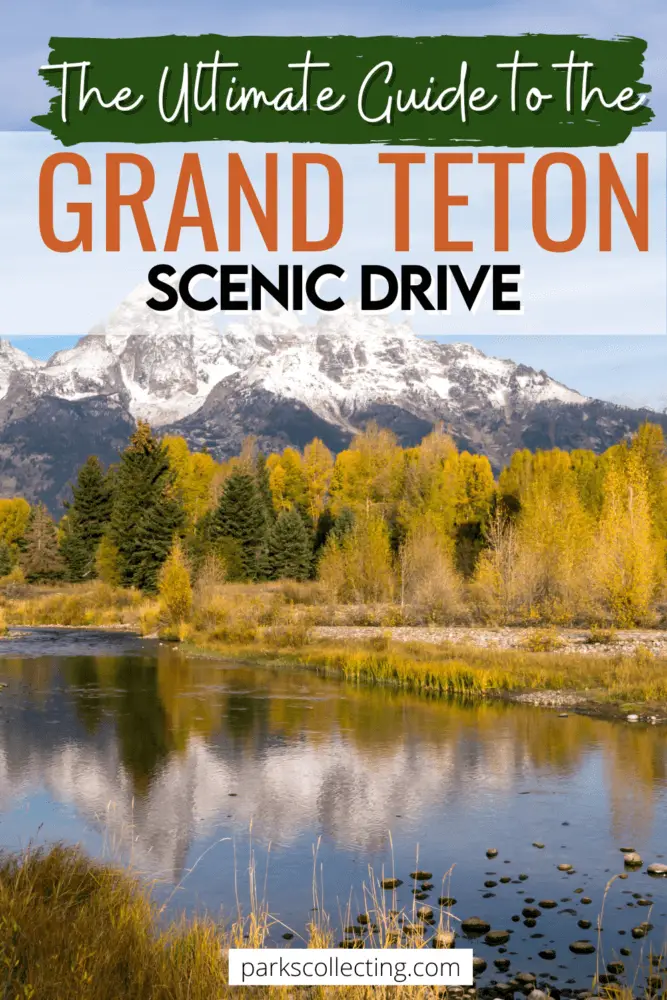
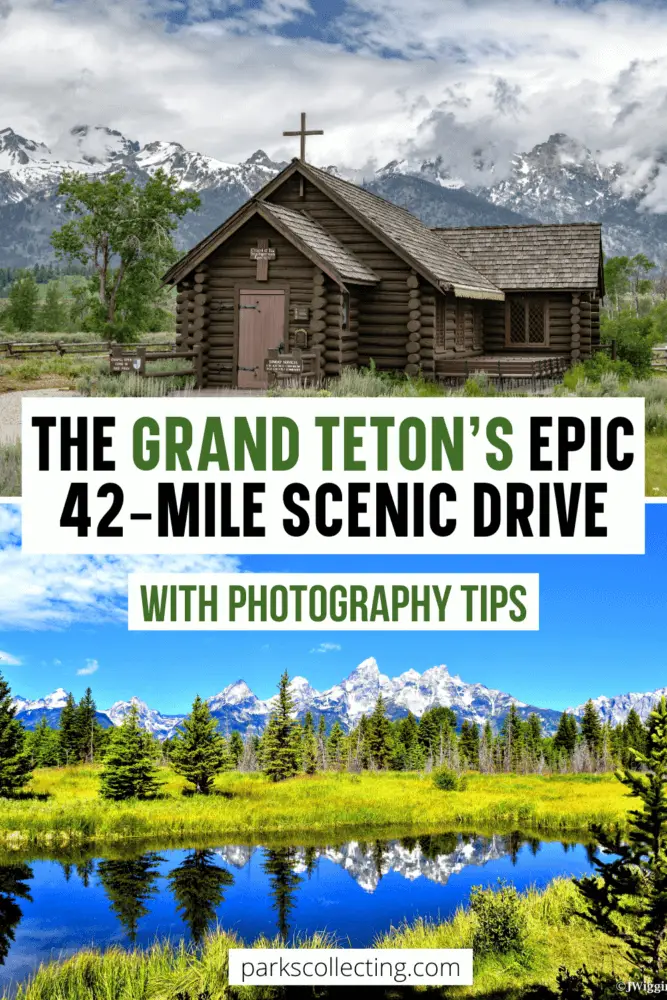
💡 Are you just starting to think about taking a national parks trip? Get Inspiration
‼️ Are you looking for helpful tips for visiting US national parks? Read articles that share useful tips on a range of national-park related issues
💻 Are you starting to plan a trip to Grand Teton National Park? Read my Guide to Grand Teton National Park
📋 Do you want a ready-made super detailed plan for your trip to Grand Teton? Get a detailed 1 – 3-day Grand Teton National Park Itinerary
🛏️ Are you looking for a place to stay near Grand Teton National Park? Find an Airbnb near Grand Teton National Park
💲 Are you ready to book your trip? Use these Planning and Booking Resources
📖 Do you want to read a book about Grand Teton National Park? Check out my Recommended Reading List for Grand Teton National Park
About the Author
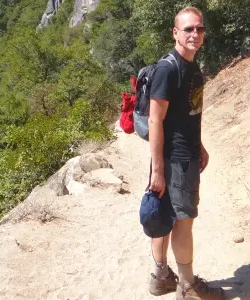
James Ian is a national park, camping and hiking expert.
He has dedicated his life to travel, visiting more than 80 countries, all 7 continents and most of the national parks in the United States. With over 35 years experience in the travel industry, James has worked on cruise ships, at resorts and hotels, and as a travel planner who’s helped hundreds of people plan successful trips to US national parks.
Based on his experience visiting our national parks multiple times, in-depth research and expertise as a travel planner, James has published detailed itineraries for many of the major national parks in the US. These itineraries, as well as in-depth park guides, and other resources will help you have your own incredible trip to US national parks without stress and hassle.
As a national park expert, James has contributed to many publications, including USA Today, Newsweek, Time Business News, Savoteur, Best Trip, and Wired.
I’m a member of the Amazon Services LLC Associates Program. As an Amazon Associate I earn from qualifying purchases.

